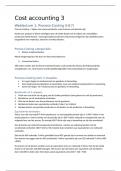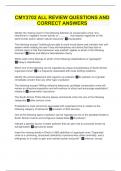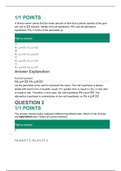Exam (elaborations)
ICT3612 Assignment 3 2024 | Due 15 July 2024
- Institution
- University Of South Africa (Unisa)
Question 1 (2 marks) Which of the following is an aggregate expression that will find the oldest date in the invoiceDate column? 1. MIN(invoiceDate) 2. MAX(invoiceDate) 3. HIGH(invoiceDate) 4. LOW(invoiceDate) Question 2 (2 marks) Which of the following LIMIT clauses will return a maximum o...
[Show more]












